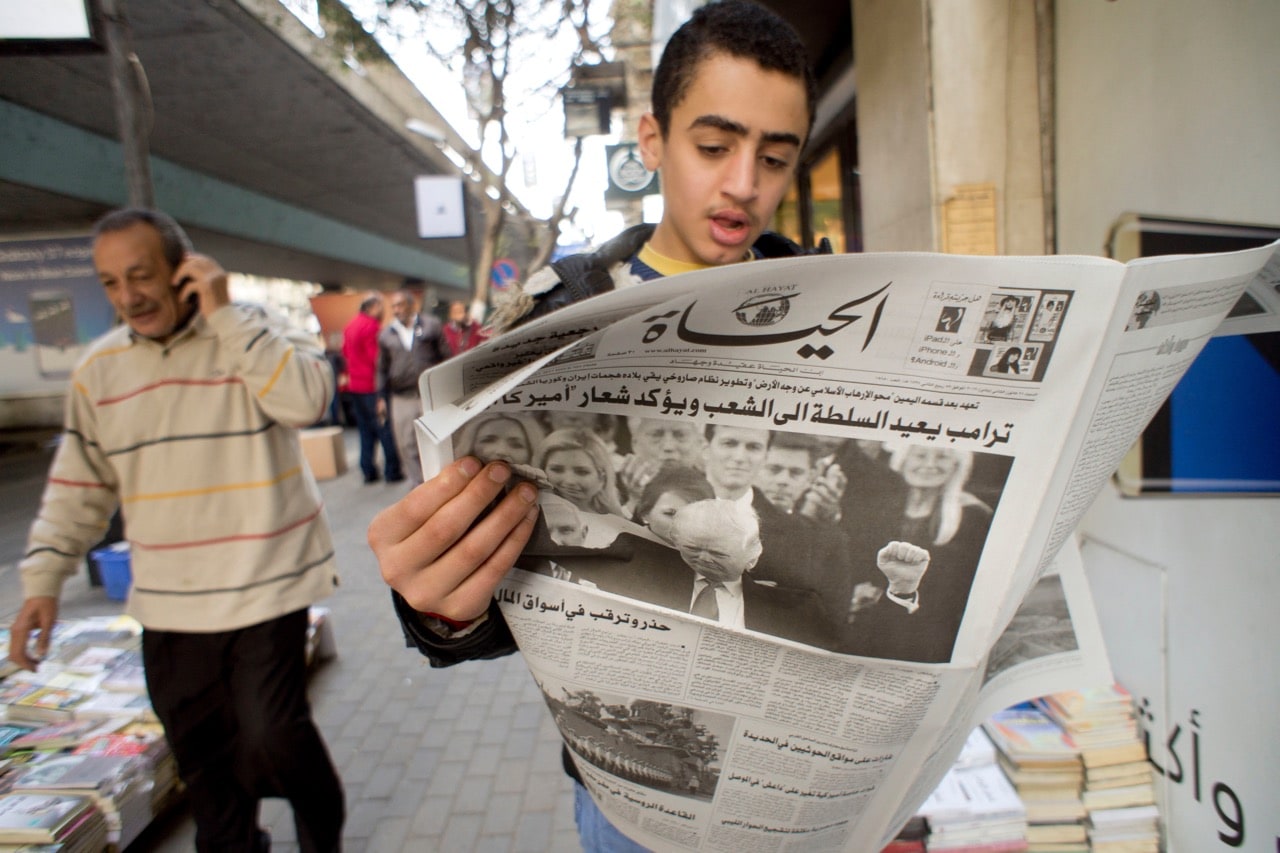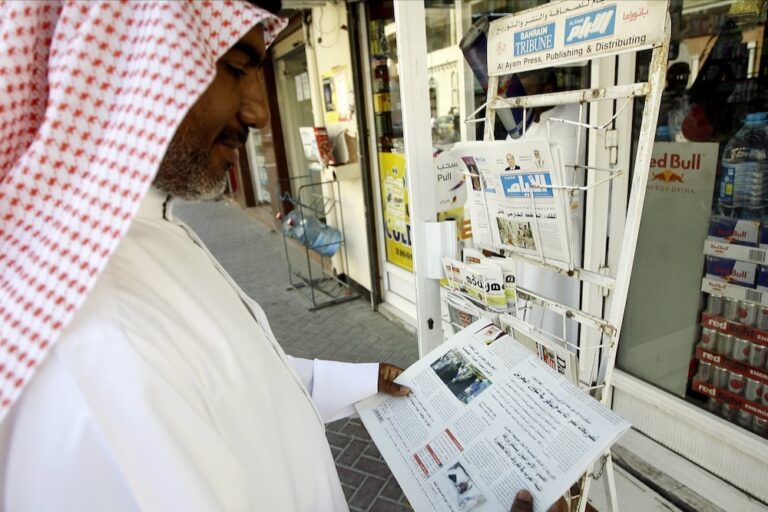Our monthly roundup spotllghts Egypt's latest efforts to control the media (and rainbow flags), the Kurdish referendum (and aftershocks), a campaign to tackle self-censorship in Palestine and much more.
Egypt
Month after month, the Egyptian government proceeds to shrink down the public sphere and extend control over the country’s various institutions. Early in September, it launched a nationalization scheme aimed at bringing independent media outlets into its fold. According to Reporters Without Borders (RSF), the roundabout nationalization of four independent media outlets – two daily newspapers and two websites – is currently under way.
For months prior to embarking on this new method of seizing control of the country[s formerly vibrant media landscape, individuals close to Egypt’s intelligence agency had set about acquiring privately owned media outlets, most prominent of which are Al-Hayat TV, ONTV, as well as Sout Al-Omma and Al Youm Al Sabea newspapers.
In a further entrenching of the current regime and its oppressive system of governance, on 25 September, the government sentenced former presidential candidate and prominent human rights lawyer Khalid Ali to three months in jail on charges of “violating public decency”. According to the Arabic Network for Human Rights Information (ANHRI), the unjust sentence is meant to disqualify him from running in the 2018 presidential elections. If the verdict is confirmed on appeal, Ali loses his right to run.
Egypt’s disrespect for the rule of law is again displayed in its refusal to release poet Khalid Said from prison despite the issuance of an order for his release. And in its most recent violation of the right to freedom of expression, Egyptian police arrested seven individuals on accusations of “promoting sexual deviancy” simply for raising a rainbow flag at a music concert on 25 September.
And it won’t stop there. On 21 September, the Cabinet approved amendments to Egypt’s Nationality Law that would strip individuals convicted of terrorist activity of their citizenship. Given the lack of due process in Egypt’s courts and a compromised judiciary, such convictions are being used to target the opposition. The draft amendments will be discussed and voted upon in parliament in October.
Yemen
In Yemen, Houthi forces continue to arbitrarily terrorise and kidnap journalists and activists. On 15 September, militias raided the home of journalist and editor Abed Al Mahathri and kidnapped him. They also captured journalist Kamel Al Khothani that same week for criticizing Houthi treatment of journalists. Both men were released a week later, and on 24 September, as was the prominent Yemeni journalist Yahya Al Jbehi, who has been in detention for over a year. Many other journalists, activists, and critics, including Hisham Al-Omeisy, remain in Houthi detention.
Morocco, Tunisia, and Algeria
In Morocco this September, attempts to clamp down on a protest movement in the northern Rif region have continued. On 14 September, an appeals court quadrupled the three months’ jail sentence previously handed down to prominent editor Hamid El Mahdaoui for allegedly “inciting a banned demonstration” in the city of Al-Hoceima. Shortly after the decision was announced, El-Mahdaoui went on hunger strike to “denounce an unfair trial, the violation of freedom of expression and non-respect for human rights.” On 25 September, human rights defender Rachid Aishi was detained and referred to trial on charges of “incitement to commit a felony by electronic means” and “incitement to disobedience” following his publishing of Facebook posts in which he called for solidarity with political detainees from the Rif region.
In Tunisia, two incidents of abuse of power by police forces marked the month of September. On 9 September, five activists were arrested by police forces for protesting against the controversial Administrative Reconciliation Act. According to Al-Monitor, if applied, the law would serve to pardon former dictator Zine El Abidine Ben Ali’s public servants. On 12 September, they were presented before the National Guard pending their appearance before the Public Prosecutor’s office, as reported by ANHRI. On 18 September, while covering a demonstration in the southeastern city of Sfax, radio reporter Hamdi Souissi was assaulted by a group of policemen and taken to a police station where he was interrogated for more than two hours.
In Algeria, on 4 September, journalists Reda Amrani and Rachid Ali Uqasi were attacked as they prepared to host a conference announcing the launch of a TV channel promoting Kabyle language and culture. In a statement on the matter, PEN International condemned the attack and called on authorities to urgently investigate and bring those responsible to justice. The attack came on the heels of a declaration by the mayor of Tamazirte, where the conference was taking place, stating that the event ran against the “founding principles of the Algerian state”. On 12 September, as reported by RSF, Algerian freelance journalist and fixer Said Chitour marked 100 days in provisional detention. Kabyle is a Berber language spoken mainly in Algeria. Kabyles have long been victims of an Arabization policy that Algerian authorities have attempted to enforce throughout the years.
Saudi Arabia
Since its recent fallout with Qatar and the ensuing Gulf crisis, Saudi Arabia has stepped up its repression of opposition figures and critics of its policies. According to ANHRI, since 14 September, Saudi authorities arrested 14 human rights defenders, activists, and clerics for either opposing Saudi Arabia’s stance in the crisis or not backing it sufficiently enough. Prominent cleric Salman Al-Awda says he was arrested for refusing to obey a number of directives from Royal Court advisors calling on him to publicly denounce Qatar. Human Rights Watch and Gulf Center for Human Rights have also reported on politically motivated arrests in Saudi Arabia this month.
In a blog post for the Electronic Frontier Foundation (EFF), Jillian York shed light on American social media companies’ compliance with Saudi demands to censor Qatari media. According to York, over the past few weeks, both Medium and Snap have caved to Saudi demands to geoblock journalistic content in the kingdom. York urged Medium and Snap to “reconsider their decisions, and for other companies to strengthen their commitment to freedom of expression by refusing to bow to demands from authoritarian governments when they’re not legally bound to.”
In Brief
In the West Bank, according to Global Voices, the Palestinian Authority has continued its crackdown on online dissent by arresting Palestinian activist Issa Amro for criticizing a journalist’s arrest on Facebook. As a prominent advocate of non-violent resistance, Amro also faces legal challenges from Israel.
In Iran, where the media landscape is heavily restricted and controlled, earlier promises by the Rouhani government to ease restrictions on Iranians’ access to the internet are still nowhere close to becoming a reality. An RSF report this month exposed the changing direction of Iranian intelligence agencies’ approach to suppressing Iranian journalists abroad as well, noting that because of a more conciliatory foreign policy since Hassan Rouhani became president in 2013, the regime has limited its use of direct harassment in favour of more subtle threats. In the most recent free expression news from Iran, teacher and poet Mahvash Sabet, one of a group of seven Baha’i leaders known as the ‘Yaran-i-Iran’ – ‘Friends of Iran’ – detained in 2008, was released. Many other journalists, critics, and opposition members remain imprisoned in dire conditions.
In Iraqi Kurdistan, after a historic 25 September referendum on Kurdish independence and as tensions at the local, regional, and international level grow more palpable, reports of media outlets banned, others suspended, and journalists threatened have surfaced. Reporters Without Borders issued a statement on 28 September calling on Kurdish authorities to “safeguard the right to criticize in what is now an increasingly uncertain political environment.”
On 19 September, in Bahrain, authorities brought new charges against human rights defender and co-founder of the Bahrain Network for Human Rights (BCHR) Nabeel Rajab, who has been in jail since June 2016. Four other activists working for BCHR were also summoned by the anti-terrorism tribunal this month for interrogation. All four are being charged with “illegal gathering” under the controversial anti-terrorism law.
In Jordan, the Center for Defending Freedom of Journalist (CDFJ) was publicly accused of failing to properly register as a non-profit organization. A Jordanian trade regulatory body referred the case to Jordan’s attorney-general who can then begin a legal process against the group, according to the Committee to Protect Journalists (CPJ).
Campaign of the month
The Palestinian Center for Media Freedoms and Development (MADA) launched a campaign to discourage and reduce self-censorship amongst West Bank journalists. The campaign included raising awareness of the negative effects of self-censorship by journalists on Facebook and the hosting of three workshops in Bethlehem, Nablus, and Ramallah for journalists on how to resist self-censorship. According to an earlier study by MADA, around 80 per cent of Palestinian journalists self-censor in their reporting. Since the new cybercrimes law came into effect, that percentage is expected to increase.



